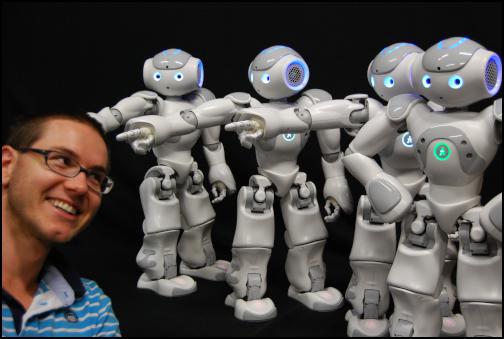UC researchers believe robots can persuade people to conform

UC researchers believe robots can persuade people to conform
March 24, 2014
A team of University of Canterbury (UC) researchers and scientists believe robots can persuade people to conform through group pressure.
PhD student Juergen Brandstetter has been exploring how a group of robots can actually influence people when their numbers are in the majority.
Brandstetter surveyed almost 50 people in a room, one at a time with four robots. Results were promising and largely confirmed that the robots could encourage a single person to conform with the group.
One of the tests included speaking in the past tense and the evidence from the survey suggested robots can influence language and further influence human opinion.
``Even though each person knew exactly what was right or wrong, the person unintentionally agreed with the group of robots a significant number of times.
``Our results showed that robots can induce conformity but to a significantly lesser degree than humans. We also found that there is substantial difference between visual and the verbal tasks. But we are convinced robots are capable of changing our behaviour even though they are still not as influential as humans can be.
``We measured the impact robots have on the English language and looked at the conformity rate robots have on people. The results showed that people would follow robots. Robots clearly pushed people into using the wrong English tense.’’
Brandstetter carried out his research under the supervision of Dr Christoph Bartneck from UC’s HIT Lab NZ and support from UC’s New Zealand Institute of Language, Brain and Behaviour and theNorthwestern University of Illinois.
``This research is important to New Zealand and society as the digital ager intensifies. Nearly 160,000 robots were commercially sold worldwide in 2012 and the sale of industrial robots to the automotive industry continues to increase.
``Asia, including Australia and New Zealand, was by far the biggest market with 84,645 industrial robots sold. One of the Government’s 10 National Scientific Challenges announced last year included robotic development. Some New Zealand companies are developing industrial robots.
``We will one day soon see personal robots that could help assist elderly people living alone, or taking care of children and offering information in public places. Japan is the world leader in this area and they are developing robots for their domestic market.
``We already have more mobile phones than humans and that we expect that the ratio of robots to humans on this planet will shift in the future strongly towards a majority of robots.
``Researchers at UC can offer their expertise to industry and work together to create a totally new industry with the obvious benefit to the New Zealand public,’’ Brandstetter says.
ENDS


 Waipa Networks: Cambridge Is Open For Business With $45M Energy Boost
Waipa Networks: Cambridge Is Open For Business With $45M Energy Boost Master Plumbers Gasfitters and Drainlayers NZ: New Consumer NZ Test Reveals Danger Of Unregulated Online Plumbing Products
Master Plumbers Gasfitters and Drainlayers NZ: New Consumer NZ Test Reveals Danger Of Unregulated Online Plumbing Products Mindful Money: Winners At The Mindful Money Annual Ethical & Impact Investment Awards 2025
Mindful Money: Winners At The Mindful Money Annual Ethical & Impact Investment Awards 2025 MBIE: Gas Supply Reducing Faster And Sooner Than Previously Forecast
MBIE: Gas Supply Reducing Faster And Sooner Than Previously Forecast Natural Hazards Commission: International Markets Show Unprecedented Confidence In NZ’s Natural Hazards Insurance Scheme
Natural Hazards Commission: International Markets Show Unprecedented Confidence In NZ’s Natural Hazards Insurance Scheme  ASB Bank: ASB Business Survey - The Impact Of Trump's Tariffs, According To Kiwi Businesses
ASB Bank: ASB Business Survey - The Impact Of Trump's Tariffs, According To Kiwi Businesses


